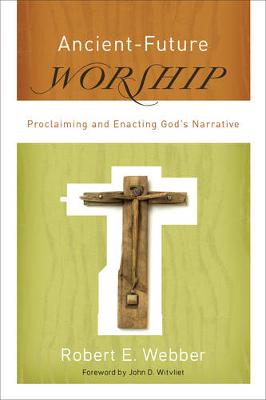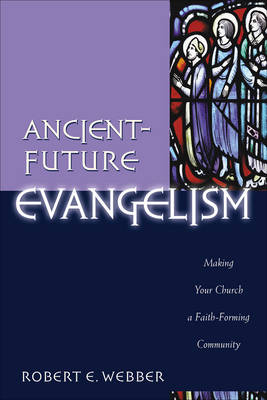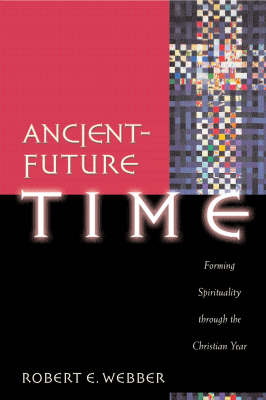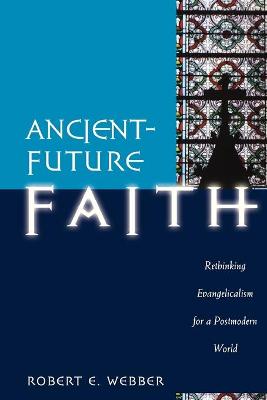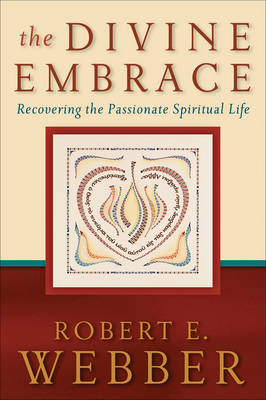Ancient-Future
5 total works
With the many models of worship available, choosing a style to worship God can be a bit overwhelming. Is it better to go with traditional or contemporary models? Christians may find themselves asking how early believers worshiped and whether they can provide insight into how we should praise God today.
Rooted in historical models and patristic church studies, Ancient-Future Worship examines how early Christian worship models can be applied to the postmodern church. Pastors and church leaders, as well as younger evangelical and emerging church groups, will find this last book in the respected Ancient-Future series an invaluable resource for authentic worship.
Rooted in historical models and patristic church studies, Ancient-Future Worship examines how early Christian worship models can be applied to the postmodern church. Pastors and church leaders, as well as younger evangelical and emerging church groups, will find this last book in the respected Ancient-Future series an invaluable resource for authentic worship.
Following his well-received Ancient-Future Faith, Robert Webber presents a new model for evangelism and discipleship, the first in a series of four books applying his theoretical ideas to practical situations.
Part 1 of Ancient-Future Evangelism surveys evangelism and Christian formation throughout the church and then translates the process for twenty-first-century Christians. Webber presents evangelism as four distinct stages and suggests three accompanying rites of passage that can be easily adapted to any church tradition.
Part 2 underscores how the four-fold process of faith formation is interwoven with three theological principles: Christ as victor over evil, the church as witness to God's salvation, and worship as a witness to God's mission accomplished in Jesus.
Ancient-Future Evangelism will appeal to both emerging evangelicals as well as traditional church leaders. It relates faith to Christian practice by drawing wisdom from the past and translating those insights into the present and future life of the church.
Part 1 of Ancient-Future Evangelism surveys evangelism and Christian formation throughout the church and then translates the process for twenty-first-century Christians. Webber presents evangelism as four distinct stages and suggests three accompanying rites of passage that can be easily adapted to any church tradition.
Part 2 underscores how the four-fold process of faith formation is interwoven with three theological principles: Christ as victor over evil, the church as witness to God's salvation, and worship as a witness to God's mission accomplished in Jesus.
Ancient-Future Evangelism will appeal to both emerging evangelicals as well as traditional church leaders. It relates faith to Christian practice by drawing wisdom from the past and translating those insights into the present and future life of the church.
Millions of Christians worldwide follow the liturgical Christian calendar in their worship services and in their own personal devotions. The seasons of the Christian year connect believers of diverse backgrounds and offer the sense of unity Jesus desired.
Robert Webber believes that we can get even more out of the Christian calendar. He contends that through its rich theological meanings the Christian year can become a cycle for evangelism and spiritual formation. He offers pastors, church leaders, and those of the "younger evangelical" mind-set practical steps to help achieve this end, including preaching texts and worship themes for Lent, Easter, Pentecost, Advent, and Christmas.
Robert Webber believes that we can get even more out of the Christian calendar. He contends that through its rich theological meanings the Christian year can become a cycle for evangelism and spiritual formation. He offers pastors, church leaders, and those of the "younger evangelical" mind-set practical steps to help achieve this end, including preaching texts and worship themes for Lent, Easter, Pentecost, Advent, and Christmas.
In a world marked by relativism, individualism, pluralism, and the transition from a modern to a postmodern worldview, evangelical Christians must find ways to re-present the historic faith. In his provocative new work, Ancient-Future Faith, Robert E. Webber contends that present-day evangelicalism is a product of modernity. Allegiance to modernity, he argues, must be relinquished to free evangelicals to become more consistently historic. Empowerment to function in our changing culture will be found by adapting the classical tradition to our postmodern time. Webber demonstrates the implications in the key areas of church, worship, spirituality, evangelism, nurture, and mission. Webber writes, "The fundamental concern of Ancient-Future Faith is to find points of contact between classical Christianity and postmodern thought. Classical Christianity was shaped in a pagan and relativistic society much like our own. Classical Christianity was not an accommodation to paganism but an alternative practice of life.
Christians in a postmodern world will succeed, not by watering down the faith, but by being a counter cultural community that invites people to be shaped by the story of Israel and Jesus." A substantial appendix explores the development of authority in the early church, an important issue for evangelicals in a society that shares many features with the Roman world of early Christians. Students, professors, pastors, and laypeople concerned with the church's effective response to a postmodern world will benefit from this paradigmatic volume. Informative tables and extensive bibliographies enhance the book's educational value.
Christians in a postmodern world will succeed, not by watering down the faith, but by being a counter cultural community that invites people to be shaped by the story of Israel and Jesus." A substantial appendix explores the development of authority in the early church, an important issue for evangelicals in a society that shares many features with the Roman world of early Christians. Students, professors, pastors, and laypeople concerned with the church's effective response to a postmodern world will benefit from this paradigmatic volume. Informative tables and extensive bibliographies enhance the book's educational value.
One of the most popular current views on spirituality is that there are varied paths to God. In this new Ancient-Future series book, Bob Webber evaluates this common misunderstanding of spirituality as separated from God's story, extremely self-focused, and shaped by our surrounding culture. This challenging work offers a corrective, calling us to an alternative Christian spirituality, one that reveals two sides-that of God's "divine embrace" of us and our passionate response. The Divine Embrace is a fresh, grounded look at true spirituality that will be embraced by pastors, thinking Christians, and anyone looking for an engaging and thorough treatment of this topic.
